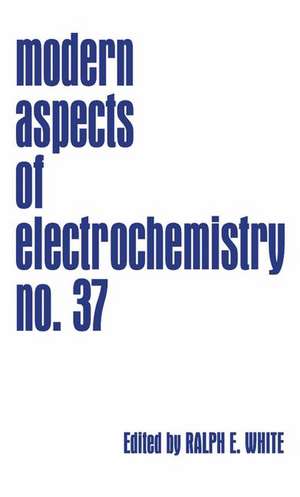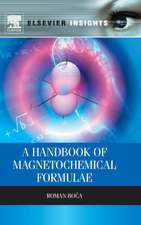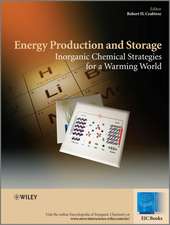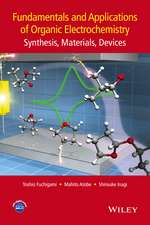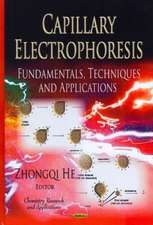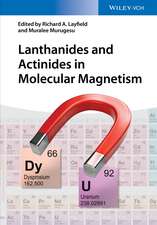Modern Aspects of Electrochemistry: Modern Aspects of Electrochemistry, cartea 37
Editat de Ralph E. White, Brian E. Conway, Costas G. Vayenasen Limba Engleză Hardback – 31 dec 2003
| Toate formatele și edițiile | Preț | Express |
|---|---|---|
| Paperback (2) | 945.62 lei 43-57 zile | |
| Springer Us – 9 feb 2013 | 945.62 lei 43-57 zile | |
| Springer Us – 6 dec 2010 | 945.92 lei 43-57 zile | |
| Hardback (2) | 950.66 lei 43-57 zile | |
| Springer Us – 31 dec 2003 | 950.66 lei 43-57 zile | |
| Springer Us – 30 noi 2002 | 952.26 lei 43-57 zile |
Din seria Modern Aspects of Electrochemistry
-
 Preț: 388.13 lei
Preț: 388.13 lei -
 Preț: 393.13 lei
Preț: 393.13 lei - 18%
 Preț: 1234.14 lei
Preț: 1234.14 lei - 18%
 Preț: 961.55 lei
Preț: 961.55 lei -
 Preț: 396.40 lei
Preț: 396.40 lei - 18%
 Preț: 1224.99 lei
Preț: 1224.99 lei - 18%
 Preț: 956.69 lei
Preț: 956.69 lei - 18%
 Preț: 1236.06 lei
Preț: 1236.06 lei - 15%
 Preț: 643.34 lei
Preț: 643.34 lei - 15%
 Preț: 707.31 lei
Preț: 707.31 lei - 15%
 Preț: 640.71 lei
Preț: 640.71 lei - 18%
 Preț: 946.10 lei
Preț: 946.10 lei - 18%
 Preț: 944.51 lei
Preț: 944.51 lei - 23%
 Preț: 780.09 lei
Preț: 780.09 lei - 18%
 Preț: 951.29 lei
Preț: 951.29 lei - 18%
 Preț: 1827.32 lei
Preț: 1827.32 lei - 18%
 Preț: 945.92 lei
Preț: 945.92 lei
Preț: 950.66 lei
Preț vechi: 1159.34 lei
-18% Nou
Puncte Express: 1426
Preț estimativ în valută:
181.91€ • 190.41$ • 151.41£
181.91€ • 190.41$ • 151.41£
Carte tipărită la comandă
Livrare economică 31 martie-14 aprilie
Preluare comenzi: 021 569.72.76
Specificații
ISBN-13: 9780306482267
ISBN-10: 0306482266
Pagini: 368
Ilustrații: XV, 368 p. 20 illus.
Dimensiuni: 140 x 216 x 22 mm
Greutate: 0.59 kg
Ediția:2004
Editura: Springer Us
Colecția Springer
Seria Modern Aspects of Electrochemistry
Locul publicării:New York, NY, United States
ISBN-10: 0306482266
Pagini: 368
Ilustrații: XV, 368 p. 20 illus.
Dimensiuni: 140 x 216 x 22 mm
Greutate: 0.59 kg
Ediția:2004
Editura: Springer Us
Colecția Springer
Seria Modern Aspects of Electrochemistry
Locul publicării:New York, NY, United States
Public țintă
ResearchCuprins
1 Kinetics of Electrochemical Hydrogen Entry into Metals and Alloys.- 2 The Electrochemistry, Corrosion and Hydrogen Embrittlement of Titanium.- 3 Electrochemical Oxidation of Organics on Iridium Oxide and Synthetic Diamond Based Electrodes.- 4 Fuel Cells.- 5 Trace-Anion Catalysis of Outer-Sphere Heterogeneous Charge-Transfer Reactions.- 6 Thermodynamic and Transport Properties of Bridging Electrolyte-Water Systems.- References.
Recenzii
From reviews of previous volumes:
"This long-standing series continues its tradition of offering high quality reviews of established and emerging subject areas, together with the less common aspects of electrochemical science ... Deserves a place in electrochemistry libraries and should prove useful to electrochemists and related workers."
(Chemistry and Industry)
"Continues the valuable service that has been rendered by the Modern Aspects series."
(Journal of Electroanalytical Chemistry)
"Will definitely be of much use to researchers in the field of electrochemistry ... The editors of this well-produced volume deserve all appreciation for maintaining the excellent standard of the series."
(Bulletin of Electrochemistry)
"Extremely well-referenced and very readable ... Maintains the overall high standards of the series."
(Journal of the American Chemical Society)
"This long-standing series continues its tradition of offering high quality reviews of established and emerging subject areas, together with the less common aspects of electrochemical science ... Deserves a place in electrochemistry libraries and should prove useful to electrochemists and related workers."
(Chemistry and Industry)
"Continues the valuable service that has been rendered by the Modern Aspects series."
(Journal of Electroanalytical Chemistry)
"Will definitely be of much use to researchers in the field of electrochemistry ... The editors of this well-produced volume deserve all appreciation for maintaining the excellent standard of the series."
(Bulletin of Electrochemistry)
"Extremely well-referenced and very readable ... Maintains the overall high standards of the series."
(Journal of the American Chemical Society)
